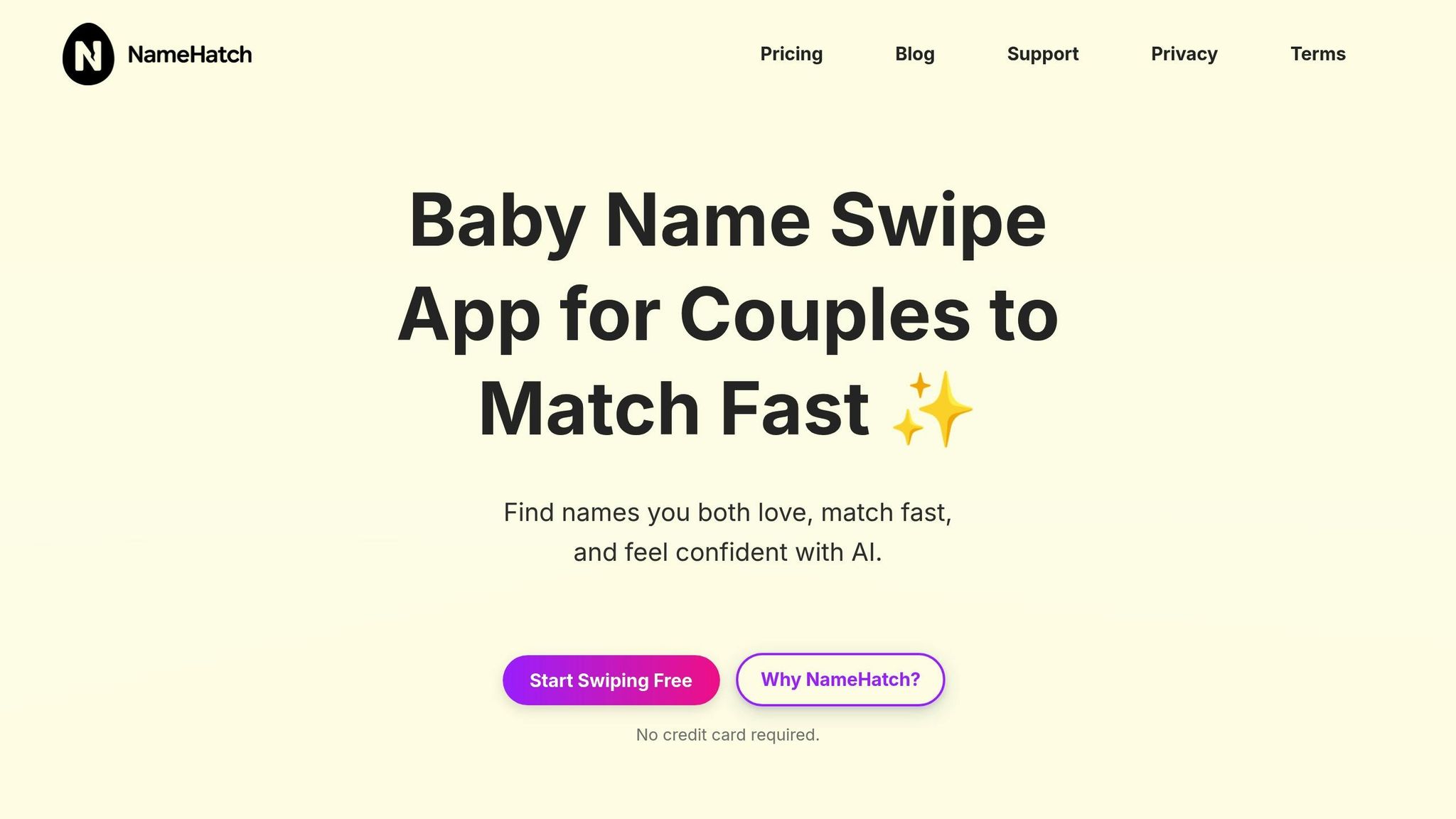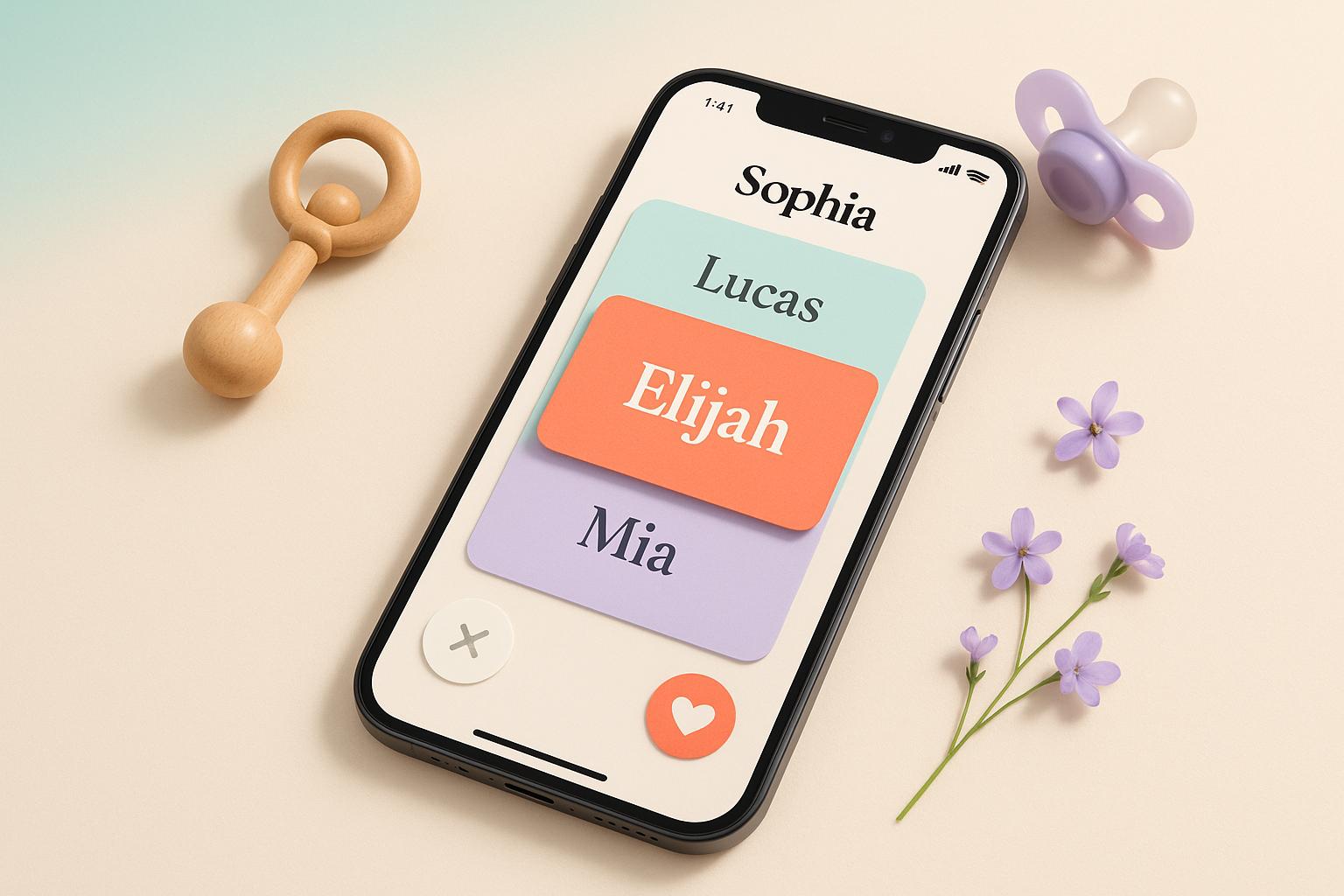A child’s name is more than just a word - it’s a connection to their identity, family, and history. Teaching kids about the meaning and story behind their names helps them feel confident, respected, and connected to their heritage. Here’s why it matters:
- Names build identity: They link children to their family, culture, and personal story.
- Respect for others: Learning about names fosters understanding of others’ identities.
- Cultural roots: Names often carry traditions, values, and history.
- Confidence: Knowing their name’s meaning empowers kids in social settings.
Parents can make this learning fun by sharing stories, teaching pronunciation, and exploring their name’s origins. Tools like NameHatch use AI to uncover deeper insights about names, blending technology with storytelling to enrich family conversations.
A name is a gift of identity. Helping kids understand theirs creates pride and strengthens their sense of belonging.
My Name Is A Story
Understanding the Meaning and Personal Value of Names
Names are powerful links that tie us to our history, define our present, and shape our future. When children grasp the meaning behind their names, they gain a stronger sense of identity and a clearer understanding of their place in the world.
The bond between names and identity is profound. As one expert puts it:
"Names are more than just words; they're an integral part of our identity. They carry the history of our ancestors, the culture of our homeland, and the uniqueness of our personal story. When someone makes an effort to learn and correctly pronounce our name, it's a sign of respect and acknowledgment of our individuality and heritage."
For children, especially, this understanding becomes vital as they navigate their sense of belonging. Names are more than labels - they are markers of traditions passed down through generations. They connect the past to the present, language to culture, and individuals to their communities. A name is often the first and most enduring thread that ties a person to their ancestry.
How Names Reflect Heritage
Across the globe, naming traditions reveal cultural values and beliefs, turning names into living records of heritage and identity.
In Ghana, for instance, the Akan people name children based on the day of the week they are born. Each name carries a spiritual significance, tying the child to a particular role within the community from birth. In Japan, family names often reflect geographic origins or ancestral occupations, preserving stories of where families lived or the work they did generations ago.
For the Lakota Sioux, names are often granted through ceremonies and may reflect personal traits, spiritual visions, or major life events. These names are not simply given - they are celebrated as part of a child's spiritual and personal journey.
These diverse traditions highlight how communities use names to honor their values, history, and beliefs. When children learn about these practices - whether from their own background or others - they gain a deeper appreciation for the variety of human experiences and the universal role of names in shaping identity. These customs not only preserve cultural heritage but also provide a foundation for personal stories that make each name meaningful.
Personal Stories Behind Names
Beyond cultural customs, every name carries a unique story that connects a child to their family's history. These individual stories often hold the deepest meaning, reflecting the love, hope, and dreams parents pour into choosing a name.
Sharing the story behind a name gives children a window into their family's legacy. It strengthens their connection to their roots and helps them see the values and history that shaped their family.
Some names honor loved ones, keeping the memory of family members alive. Naming a child after a relative can deepen family bonds and create a sense of belonging. Other names may carry specific meanings or tell stories that parents want to pass down, such as honoring a loved one who has passed away. These connections help children see themselves as part of their family's ongoing story.
As one educator explains:
"Our names are the first gift of our identity, the first story of our culture. For expat kids and Third Culture Kids navigating the complex waters of identity, being called by their true name can be a powerful affirmation of their individuality and heritage."
Even when parents don’t initially know the full meaning or origin of their child’s name, discovering it together can become a shared journey into family history. Researching a name’s background can uncover unexpected ties to different cultures, historical figures, or significant ideas, enriching a child’s understanding of their identity.
Understanding one’s heritage is a powerful way to understand oneself. Parents can use the story of a name as a starting point for broader conversations about family history, cultural roots, and the values that define their family. These discussions not only help children take pride in their heritage but also build confidence in their unique place in the world. Exploring these personal stories together opens the door to meaningful conversations about identity and belonging.
How to Teach Kids About Their Names
Once parents grasp the powerful link between names and identity, the next step is turning that understanding into meaningful, age-appropriate conversations with their kids. Teaching children about their names can be a fun and engaging process that builds their confidence and connection to their identity.
Sharing the Name's Story
Storytelling is a wonderful way to help children understand the special meaning behind their names. Research suggests that storytelling is an effective way to make experiences memorable and meaningful. By sharing the story of how their name was chosen, parents can create an emotional bond that stays with their child.
For toddlers between 18 months and 3 years, keep the story simple and animated. Use expressive gestures, facial expressions, and an engaging tone to bring the tale to life. For example, you might say, "Your name, Emma, means 'whole' or 'universal,' just like how you make our family feel complete!" You can also connect the name's meaning to their everyday actions. If your child's name means "brave", highlight moments when they show courage, like trying something new or climbing up the slide at the playground.
As kids grow older, they can handle more detailed stories. Share the moment you decided on their name, describe family discussions about it, or explain any traditions that influenced your choice. Encourage them to ask questions and even retell the story in their own words. Paint a vivid picture of when and where the decision was made to show how much thought and care went into choosing their name. Over time, they might enjoy sharing their name’s story with others, building pride and confidence.
Once the story becomes familiar, it’s time to focus on pronunciation and spelling.
Teaching Pronunciation and Spelling
Helping kids learn to pronounce and spell their names correctly not only builds their confidence but also teaches them self-advocacy - especially if their name is less common or tricky for others to pronounce. Start by practicing the pronunciation together daily. Break it into syllables if needed, and make it fun by clapping or creating a rhythm as you say the name. Teach them polite ways to correct others, like saying, "Actually, it's pronounced…" or "It sounds like…" followed by a familiar word for comparison.
You can also make learning interactive. Try tracing letters together, incorporating their name into art projects, or playing spelling games during everyday activities. Role-playing can help them feel prepared for social situations - practice how they might respond if a teacher mispronounces their name or if a classmate asks about its origin. For an extra touch, consider creating a simple "name card" with the correct pronunciation written phonetically, along with the name’s meaning and origin. This can help others understand and respect their name.
Once kids feel confident saying and spelling their name, you can weave its meaning into daily family life.
Making Name Meaning Part of Daily Life
Bringing a name’s meaning into everyday routines helps kids appreciate its significance and strengthens their connection to their identity. If your family celebrates name days, make it a special occasion with a meaningful meal, story, or gift tied to the name’s meaning.
Use nicknames that reflect the name’s significance instead of just shortening it. For instance, if your child’s name means "light", you might affectionately call them "sunshine" during joyful moments. If their name represents strength, recognize their resilience when they overcome a challenge. You can also honor their name’s roots by exploring family traditions - this could include cooking dishes from the name’s country of origin, learning phrases in the associated language, or enjoying music and art from that culture. These activities not only reinforce the name’s meaning but also deepen family bonds.
Visual reminders can also make a big impact. Display artwork that reflects the name’s meaning, hang a map showing its geographic origin, or keep books about its cultural background on your bookshelf. Regularly talk about the name’s meaning and acknowledge when your child displays qualities tied to it. This helps them see their name as more than just a label - it becomes a source of pride and inspiration.
sbb-itb-f13f980
Using Technology to Explore Name Heritage
Thanks to modern technology, families now have exciting tools to dive deeper into their name heritage. AI-powered platforms can sift through massive datasets in no time, uncovering connections and patterns that might otherwise go unnoticed. This makes tracing the origins of your child's name not just easier but also more engaging.
These tools outpace traditional research methods, helping families unearth stories and cultural ties that could have taken weeks or even months to uncover manually. By combining artificial intelligence with genealogical databases, parents can share richer, more detailed narratives about the origins of their children’s names. This blend of cutting-edge technology and time-honored traditions paves the way for platforms like NameHatch.
How NameHatch Can Help

NameHatch takes these technological advancements and makes them accessible for families. Its AI-powered features are a fantastic gateway to exploring name heritage with your children.
A standout feature is its personalized AI suggestions, which help parents find names with similar meanings or origins. Imagine telling your child that their name means "brave" and then using NameHatch to show them other names from around the globe that share the same meaning. It’s a wonderful way to highlight how values like courage are celebrated universally.
For families with diverse backgrounds, NameHatch's global filter is especially useful. This geographic link adds depth and makes the story of their name more vivid and memorable.
The platform also doubles as a conversation starter for families planning to grow. Involving older children in the NameHatch experience can help them appreciate the thought and care that went into choosing their own name. Seeing how parents consider meaning, cultural significance, and family heritage can foster a deeper connection to their name and family history.
Combining Technology with Storytelling
Pairing digital tools with storytelling can make name heritage even more meaningful. Start with NameHatch to uncover the origins of your child’s name, then weave those details into a narrative they’ll cherish. AI can even help map timelines and link key events to locations, offering a richer understanding of your family’s naming traditions.
You could create a digital scrapbook that combines technology with personal stories. Record videos of your child sharing what their name means to them, and include screenshots from NameHatch that highlight the name’s history and significance. Over time, this keepsake will only grow in value.
Another idea is to use AI tools to enhance old family photos that tie into your child’s name. For example, if your child is named after a great-grandparent, AI can restore and colorize old photos, making their namesake’s story feel even more alive. These visual connections can help children better understand their place in the family’s legacy.
When diving into name research, try using prompts that encourage more detailed responses. Instead of asking, "What does this name mean?" ask something like, "What are the origins of the name Emma in medieval England, and how did it spread to other countries?" This approach often uncovers richer insights, which you can turn into captivating stories for your children.
Accuracy is key, though. While technology can reveal fascinating details, it’s important to double-check the information. Use these discoveries as a starting point for deeper family conversations, encouraging your children to ask questions and reflect on the importance of their name. These moments can create lasting bonds and a greater appreciation for their heritage.
Conclusion: Building Pride Through Name Knowledge
As we've uncovered through our journey into heritage and digital discovery, a name is far more than just a label - it’s a cornerstone of identity. Teaching children about their names does more than satisfy curiosity; it instills a sense of pride and belonging. When kids learn the stories, thought, and cultural meaning behind their names, they gain a stronger connection to their heritage and a clearer understanding of their place in their family’s narrative. This knowledge shapes how they see themselves and how they present themselves to the world.
The beauty of name education lies in its simplicity. Everyday storytelling - whether it happens during a car ride, over dinner, or as part of a bedtime routine - creates a natural space to share the meaning and significance of a name. These moments not only teach but also build treasured memories that last a lifetime.
Modern technology takes this tradition a step further. Tools like NameHatch transform name discovery into an ongoing, interactive experience. With these platforms, children can explore global connections, uncover shared meanings, and dive deeper into the evolving story behind their names. Digital resources complement traditional storytelling, enriching the narrative in ways that were once unimaginable.
The benefits of this deeper understanding are tangible. Kids who know their names well can confidently introduce themselves, politely correct mispronunciations, and share fascinating details about their name’s origin. This sense of assurance often shines through in everyday interactions, especially during milestones like the first day of school.
It’s important to remember that name education isn’t a one-time conversation - it’s a lifelong journey. As children grow, their appreciation for their name’s story will evolve. A young child may delight in hearing about the day their name was chosen, while a teenager might feel a deeper connection to its cultural or historical roots. Keeping these conversations alive ensures that their pride in their name - and in themselves - continues to flourish.
"Naming is often the beginning of knowing." - Roxann Kriete
This quote beautifully captures the essence of why understanding names matters. Knowing their names allows children to better understand themselves, creating a foundation for confidence and connection. Every story shared, every conversation had, adds another layer to the rich tapestry of identity and heritage.
FAQs
How can I teach my child about the meaning and importance of their name in a fun way?
Make learning your child's name an exciting and meaningful experience by incorporating fun, interactive activities. For instance, you could work together on creative projects like tracing or decorating their name with colorful art supplies. Or, try building their name using blocks, shaping it with playdough, or even forming it with kinetic sand. These hands-on activities not only make learning enjoyable but also help create lasting memories.
Another great idea is to share the story behind their name. Whether it’s tied to a family tradition, has a deeper cultural meaning, or holds a special memory, telling them about it can help them feel connected to their identity. You could even make it a storytelling moment by reading books about names or sharing personal anecdotes. Combining playful activities with heartfelt storytelling turns learning into a positive and memorable experience for your child.
How can I teach my child about cultural naming traditions to help them appreciate diversity?
Teaching your child about naming traditions from different parts of the world is a great way to encourage an appreciation for diversity. For instance, in many Asian cultures, siblings often share a part of their names, symbolizing a sense of family unity. In Latin American families, names are frequently passed down through generations to honor ancestors, showcasing a deep respect for family heritage.
You could also delve into naming ceremonies from various regions. For example, Hindu naming ceremonies celebrate the spiritual meaning behind a child's name, while in many African cultures, rituals are performed to connect the child with their community and ancestors. Sharing these stories and customs can spark curiosity and help your child understand the rich traditions that shape identities across the globe.
How can tools like NameHatch help me explore the meaning and history of my child's name?
Tools like NameHatch turn the task of finding the perfect name for your child into an exciting and meaningful experience. With its AI-driven features, it provides personalized name suggestions and insights based on your preferences, helping you dive into the origins, stories, and traditions tied to each name.
Thanks to its interactive tools and smart filters, NameHatch simplifies what might feel like a daunting process. Instead, it becomes a fun and engaging journey, allowing you to connect more deeply with the name you ultimately choose for your child.



